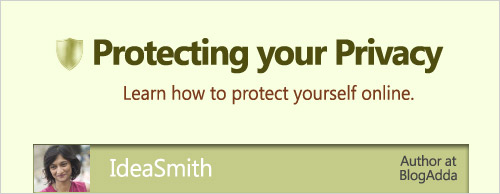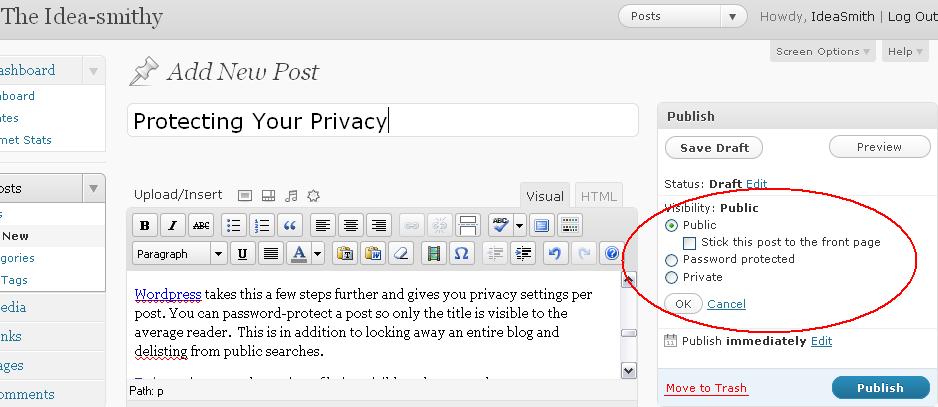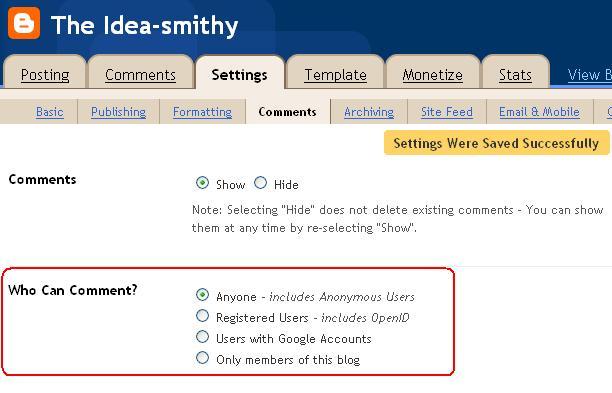Last week we discussed how to build accessibility for your blog through feeds and link-sharing mechanisms. This week let’s take a look at the exact opposite.
While the internet opens you up to a broad range of people and experiences, it also leaves you open to a number of undesirable elements. Fortunately, filtering mechanisms are available that can help you tailor your online presence with the level of accessibility and privacy that suits you the best.
Privacy is as relevant an issue as accessibility and for a number of reasons. You might use the blogosphere to explore a very different side of yourself from the one that you get to express in the outside world (like creative writing for me, vis-à-vis the businesslike, corporate life that I had). You may have a lot of intrusive family members or friends. You may write about sensitive issues and be concerned about your security. Or maybe you just value your privacy. How can you protect yourself online then?
Names
The first thing to remember is that online you can create your own identity. This means your name, your picture, contact details and any other relevant details. Handles are popular for a number of reasons. They can make you seem more interesting and can be used as instant hooks for reader interest. They can also be cloaks for your real name. Incidentally a different spelling of your name or using only the first name don’t qualify for this. Google search can reveal much to anyone who looks hard enough.
Contacts
I don’t generally advise mentioning your real name and contact details like phone numbers freely on blogs, unless required for commercial purposes. A lot of spam and unwelcome response come to you as a result of these. Also cleaning up specific words and phrases from a blog is quite laborious and not foolproof. The social networks are far easier to manage and they’re probably better for this kind of thing. A passing reference every now and then probably will not show up on a search.
It is generally good practice to allow your readers some method to contact you. Setting up a separate email address is the easiest way to do this. Of note, when you mention the address, type it out in words instead of having it hyperlinked to a new mail page. For example my email address would say ideasmithy[at]gmail[dot]com. This weeds out a sizeable amount of spambots.
Networking
I have a number of commenters who don’t like using their real identity and I don’t ask (having been an anonymous blogger for many years, who’d respect privacy more than I?). Recently someone sent me a tweet and when I asked who this was, she turned out to be one of my blog’s regulars (using yet another pseudonym) with whom I’d often interacted. Out of curiosity, I visited her Twitter page. I expected her profile to link to her blog (also anonymous). Instead it went to a Flickr link which, in the URL, contained her full name. I checked up the name on Facebook and sent her a message asking if she’d like to ‘friend’ me. She was astonished that I knew her real name and when I explained how, her response was, “Oh, I never thought of that!” .
It really is as simple as that. On the Internet, information is a click away. So if you’re maintaining multiple identities, make sure you’re careful about what gets linked to what. If you’re writing a personal blog, don’t include it on your LinkedIn profile (unless it relates to your work). If you often make jokes about work, don’t mention which company you work for (it was enough to get this lady fired).
Incidentally blogger meets/ tweetups are high-risk areas if you’re iffy about your privacy. It’s really hard to make conversation with other people in a setting designed for interaction and not let slip some details about yourself. And you can try all you like to tell everyone you meet that you don’t want your name going online. From experience I’ll say, most people don’t remember things like that and a large number of them don’t care. I’ve seen people post names, addresses, phone numbers, employer names, relationship statuses and all sorts of other details that are none of their business to share and which can potentially cause havoc for the person they’re about. There’s no point getting angry. Your privacy is your own problem so watch your step carefully if you value it.
Posting
Blogging services offer a plethora of privacy options now. Blogger allows you to choose which of your blogs you want showing up on your profile. It lets you block your blog from search engines results and database listings. And finally it also allows you make set your blog to be visible to everyone, only to people you approve or even just yourself.
WordPress takes this a few steps further and gives you privacy settings per post. You can password-protect a post so only the title is visible to the average reader.� This is in addition to locking away an entire blog and delisting from public searches.
Twitter gives you the option of being visible only to people you approve. Personally, I don’t see the point in this since Twitter is far more a social medium and much less the creative expression one that blogging is. Still, someone must benefit from it and it’s a feature you can check into if you’re one of them.
Comments
Comments don’t strictly fall under the privacy domain but they are still public and say something about who reads your blog and what they say about you. You can control this too.
Blogger gives you the option of only allowing only the comments of your blog’s members or only Google account holders or registered users (with sites like Open ID) to show up on your blog. You can also choose to hide backlinks which means your readers won’t be able to see which other sites link to your post.
There is a good deal of talk about IP address tracking. It is a fact that WordPress allows you to see the IP address from where a comment was posted. But for a large majority of non-techno-geek crowd, this doesn’t mean anything. In special cases, such as when you’re being harassed, you could keep track to see if all the comments come from the same IP address. Even so, this could fluctuate depending on where you access it from. Also, if someone is doing this from work, there’s no way to track which workstation (and hence which person) in that organization is responsible. Some of the IP addresses contain the names of the company but several of the ones I’ve seen, don’t. The most useful I’ve seen this being for the average blogger, is in being able to tell when someone is being impersonated (because the IP address doesn’t match the ones left by your friend).
Facebook is the middle name of the privacy brigade of this decade. Their features are constantly undergoing revision. I’ll do a more detailed post on integrating Facebook and blogs. But some standard rules-of-thumb: don’t mention your URL in your profile if there are people on your friends list whom you don’t want checking your blog. Visit your privacy settings often (I’d suggest at least a couple of times a month) to ensure that everything is as you’ve left it. Even Facebook has had issues here. And finally explore all their features – lists, controls, blocking etc. to see how you want your profile to look. It’s not enough to not be a regular on Facebook. If you’re there, you are visible and can be contacted, tagged, wall-written and commented on. Leaving all that information unmonitored is like falling asleep in the middle of a highway.
The Internet is a tool and a powerful one. Learn to work it so it takes you where you want to go and in the way you prefer. Until next time, keep blogging and I’ll see you (only if you want to be seen!).
“IdeaSmith is the online avatar of Ramya, an ex-business analyst on sabbatical. She loves stationery but she bid a fond goodbye to office spaces a year ago. Now she alternates between sampling panipuris, winning Monopoly games and airing her grievances on the Twitterverse.
She is currently working on her first novel. Her verbal performances air at The Idea-smithy and The XX Factor.”






Great post with really valuable suggestions and observations (Loved your example of tracking people back through their various online links!). I thought you might appreciate what we’re working on to protect peoples privacy.
http://www.getCocoon.com is a firefox plug-in that makes all your browsing and history private – by hiding your IP address (running you through a proxy). It even lets you set up temp. email accounts for websites that insist you give them your email. All your browsing is encrypted and only you have the key. Who you want to share your browsing with is up to you.
The product is in beta, and it’s free if you or your readers would like to give it a try. We would love any feedback – we are trying very hard to create a product people value!
Thanks, and again, great blog post – I’ll tweet it out to my followers now 🙂
@David: Thank you very much – for the compliment and also for sharing this information. I’m sure it will be very useful to some of our readers. Do drop in again, there’s more coming up in this series on blogging.
Ramya, Good post and valuable info.
Though many know my real name, I still prefer my pseudonym to blog and tweet and keep most of my posts/tweets general. Even with little info, some can be nosy. I’ve had people googling and reaching my blog with interesting search terms. The fact is even with all these precautions, it is easy to track people online.
Excellent points, Ramya. Helpful reminders not just for novices but pro-surfers/bloggers. Blogadda’s readers might also benefit from this blog post, entitled “Think Before You Post” at http://bit.ly/9QkFXa
@Soli: That is true. None of the methods I’ve mentioned are foolproof. But at least, you make it a wee bit harder for intrusive people to pry.
@Mansi: Thank you for sharing your link, Mansi. I particularly liked the image you used in the post. ‘Public nudity’ online is a concept worth thinking about, indeed.